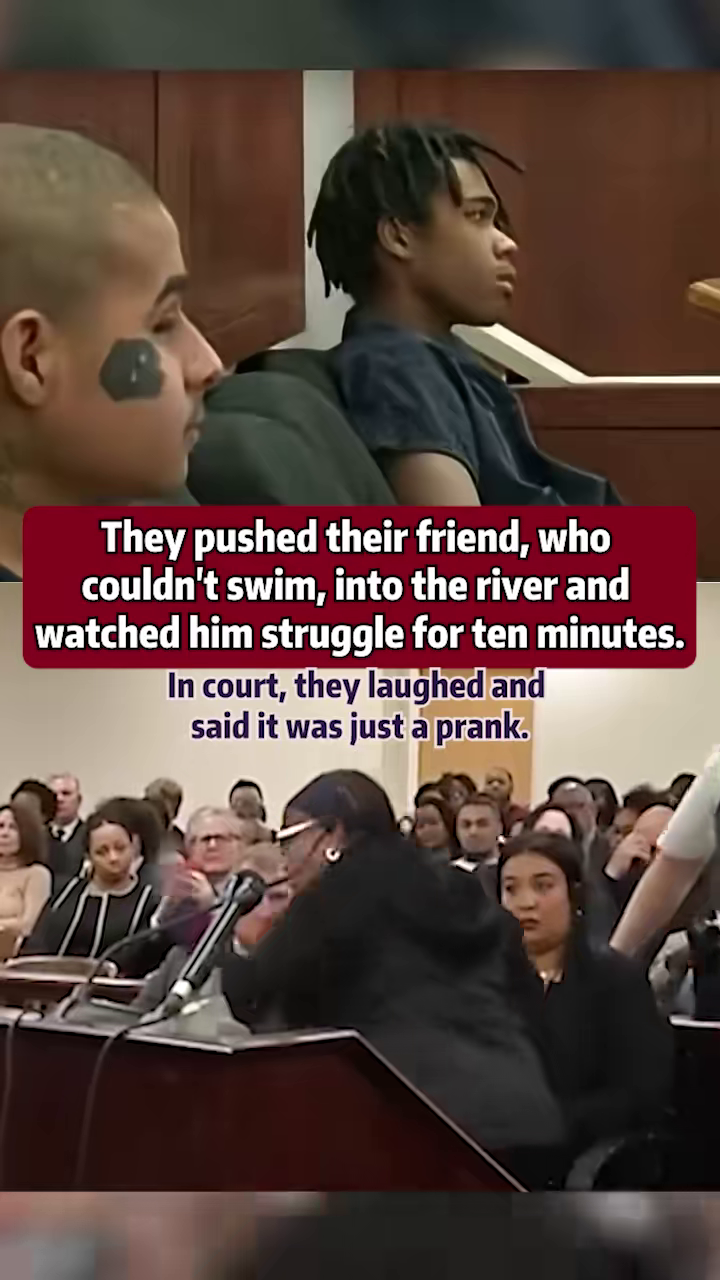The afternoon of April 14 in Farmerville, Louisiana, started like any other for 26-year-old Christopher Gilbert, a recent master’s graduate and an aspiring medical doctor. He was spending time with a group of acquaintances at a lakeside restaurant on the beautiful Lake D’Arbonne. Christopher had a bright future ahead of him, one filled with promises of healing and service to others. However, in a matter of moments, that future was brutally snatched away by an act that some would describe as a thoughtless “prank.”
The incident involved a member of the group allegedly shoving Christopher into the water. Critically, Christopher could not swim—a fact that, according to his family, was well-known by those present. This was not a playful dip; for Christopher, it was a terrifying, life-threatening crisis.
What followed turned a shocking act into a tragedy of abandonment.
Nearly Ten Minutes of Struggle and Neglect
The most disturbing element of this case, and what fueled the subsequent public outcry, was the response—or lack thereof—from the people Christopher considered friends. As Christopher struggled in the water, the individual who pushed him, and others in the group, reportedly stood by. Reports allege that they did not immediately attempt a serious, coordinated rescue, a horrific detail corroborated by the video footage that circulated on social media.
For nearly ten minutes, Christopher was submerged and fighting for his life, deprived of the oxygen his brain desperately needed. The “friends” who had initiated this dangerous act allegedly failed to act with the urgency that the situation demanded, treating the terrifying struggle of a non-swimmer as a spectacle or a joke.
The person who ultimately saved Christopher’s life was not a member of his immediate party, but a customer at the nearby restaurant. This courageous bystander recognized the severity of the situation and dove into the lake to pull Christopher to shore. The subsequent administration of CPR by this good Samaritan was crucial, though the damage had already been done.
The Fight for Life and the Devastating Diagnosis
Upon arriving at the hospital, the devastating reality of Christopher’s ordeal became clear. His mother, Yolanda George, recounted the gut-wrenching moment doctors informed her of her son’s condition: he was initially declared brain d*ad, and his other organs were beginning to f*il. He had suffered a severe anoxic brain injury—damage caused by a lack of oxygen—due to being underwater for such an extended period.
Christopher was placed on an ECMO machine (a form of life support for the lungs) and a ventilator, battling for survival against insurmountable odds. Mrs. George, heartbroken but resolute, told the press, “My son is aspiring to be a medical doctor. He got his master’s last year… for this to have happened to him, I was just devastated.”
In a small miracle of strength and perseverance, Christopher later regained consciousness and was able to eat on his own. He was temporarily taken off life support, but his injuries have left him with a profoundly altered life. He faces a long, arduous journey of recovery and rehabilitation, having lost the vibrant, independent future he had worked so hard to achieve. Reports indicate his lung function has been severely compromised, leaving him dependent on ongoing medical support. The promise of medical school has been replaced by the daily struggle for health.
The Legal Battle: ‘Horseplay’ vs. ‘Criminal Intent’
The narrative surrounding the incident immediately became a central point of conflict between Christopher’s family and the defense of the accused individual.
The friend group, when initially questioned by authorities, reportedly claimed that Christopher had simply “fllen” into the lake. This story quickly crumbled. Christopher’s family attorney, Claudia Payne, revealed that the woman who pushed Christopher had admitted her involvement to both Mrs. George and the police.
This admission led to the critical legal debate. For the defense, the act was framed as “horseplay”—a foolish but unintended accident. However, the prosecution and Christopher’s family argued that the act was far more severe: a “criminal intentional push” and a clear case of aggravated battery and serious n*gligent injury.
The legal system’s initial response was met with frustration and demands for immediate action from the community. A Change.org petition gathered thousands of signatures, pushing the Farmerville Police Department and the Union Parish Sheriff’s Office to make an ar*est. Christopher’s mother and attorney argued that given the admission and the catastrophic consequences, there was sufficient evidence for a charge. They sought not just civil redress, but criminal accountability for the person who willfully endangered Christopher’s life.
The Pursuit of Accountability and the Verdict
The pursuit of justice in this case highlights a crucial point: when does a reckless act cross the line into a crminal one? The fact that Christopher could not swim, and that his inability to do so was purportedly known, elevates the level of ngligence and intent. To intentionally propel a non-swimmer into deep water is to willfully put their life in peril.
This incident is a sobering reminder of the serious consequences that can stem from thoughtless or reckless behavior, particularly among friends. The legal proceedings eventually moved forward, focusing on the criminal implications of the push and the n*gligence of those who failed to help a man they claimed to care about.
The video references a court outcome where the primary individual responsible was sentenced for serious crmes related to aggravated battery and **serious ngligent injury**, and received a custodial sentence. While the exact length and date of the final sentencing varies in reports and remains a point of focus for the family, the court’s decision to pursue these charges validated the family’s assertion that this was more than just a “prank.” It was a devastating, life-altering crime.
A Mother’s Unending Vigil
Yolanda George continues to fight for her son, serving as his tireless advocate. The fight for Christopher has moved from the courtroom to the rehabilitation center. His journey is a testament to the resilience of the h*man spirit, but also a stark illustration of the lifelong consequences of a moment of shocking carelessness.
The story of Christopher Gilbert is more than a cr*me blotter entry; it is a plea for accountability and empathy. It compels us to consider the line between a foolish joke and a life-destroying act, and the moral obligation we have to care for one another, especially those we call friends. Christopher’s bright future as a doctor was taken from him, but his mother and supporters are determined that his story will not be forgotten and that true justice will be served.

